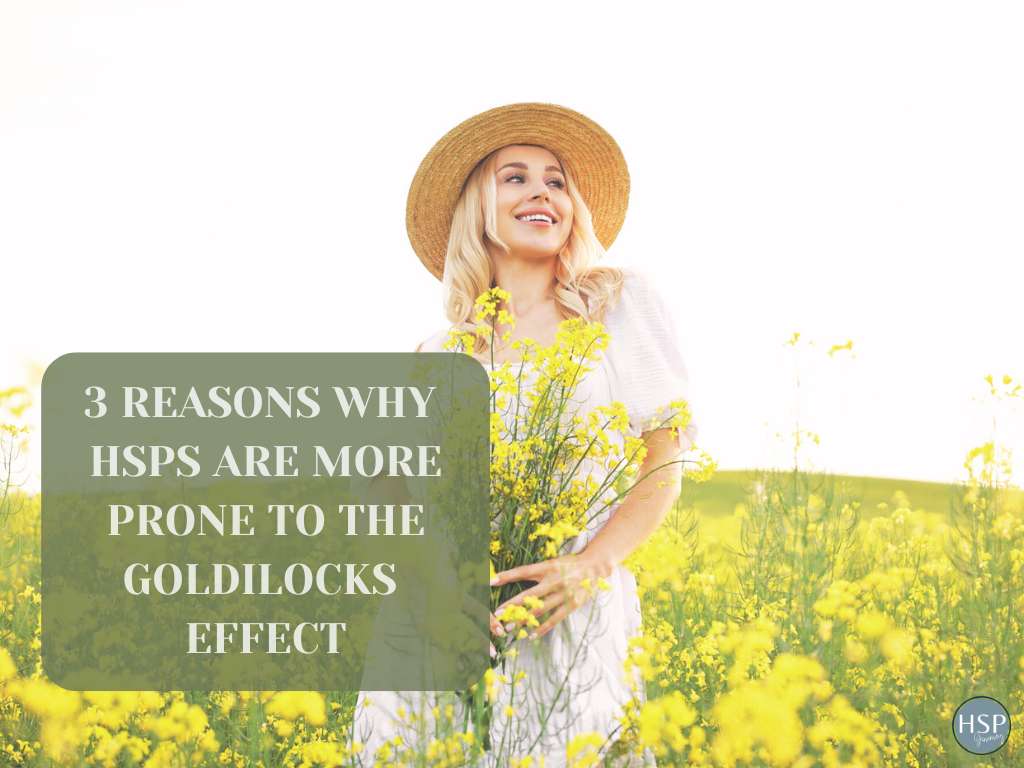Have you ever felt like Goldilocks, searching for that “just right” experience? The Goldilocks effect describes our tendency to prefer things that are neither too much nor too little, but perfectly balanced. As a highly sensitive person, you might find yourself drawn to situations, relationships, or even porridge that hit that sweet spot of complexity and comfort.
This phenomenon extends far beyond fairy tales. In real life, you may notice the Goldilocks effect influencing your choices as a sensitive person in work, relationships, and daily activities. Like the anthropic principle in cosmology, which suggests the universe is “just right” for life, you may seek environments and experiences that feel ideally suited to your needs.
For those who consider themselves highly sensitive persons (HSP), the Goldilocks effect can be particularly strong. You might find yourself more attuned to subtle differences and more easily overwhelmed by extremes. This sensitivity can make finding that “just right” balance even more crucial in your daily life and relationships.

Table of Contents
Reason #1 – HSPs are Prone To Perfectionistic Tendencies
As a Highly Sensitive Person (HSP), you may find yourself striving for perfection more often than others. This tendency can lead you to experience the Goldilocks effect in various aspects of your life.
Your heightened sensitivity makes you acutely aware of details and nuances that others might overlook. This awareness can be both a blessing and a challenge when it comes to perfectionistic tendencies.
You might find yourself constantly seeking the “just right” situation, much like Goldilocks in the classic fairy tale. This could apply to your work, relationships, or even daily routines.
Here are some ways perfectionism might manifest in your life as an HSP:
- Overthinking decisions to find the perfect solution
- Spending extra time on tasks to ensure flawless results
- Being highly critical of your own performance
- Feeling anxious when things aren’t “just right
Remember, while striving for excellence can be positive, it’s essential to find a balance. Recognizing when perfectionism is holding you back is crucial for your well-being.
Try to embrace the idea that “good enough” can sometimes be perfect in its own way. This mindset can help you navigate the Goldilocks effect more comfortably as an HSP.
Looking for HSP Tools to Thrive in a Chaotic World?
The modern world is often overwhelming and stressful for those of us with sensitive nervous systems. Many of us have suffered from the challenges of high stress, anxiety, sensory overload, and mental health and physical health issues. Fortunately, after years of working with and researching Highly Sensitive People (HSPs), Julie Bjelland has developed many tools that have not only helped her but thousands of HSPs all over the world move out of survival mode living and into thriving. In this free webinar, she’ll share the tools that HSPs have found the most life-changing. Her goal is to help you live to your fullest potential because the world needs you.
Join this free webinar and get tools to help you thrive as an HSP!
Reason #2 – HSPs Desire to Meet Their Needs When Possible
As a highly sensitive person (HSP), you have a strong desire to meet your unique needs whenever possible. This inclination stems from your heightened awareness of your environment and internal experiences.
You may find yourself seeking out situations that feel “just right” to accommodate your sensitivity. This could mean preferring quieter spaces or carefully selecting your social interactions.
HSP jurors often require more evidence to reach a decision, illustrating how this trait can influence various aspects of life. Your need for thorough information and consideration is a hallmark of the HSP experience.
In your daily life, you might:
- Choose specific lighting conditions
- Opt for particular textures in clothing
- Seek out environments with minimal sensory stimulation
These choices reflect your desire to create an optimal personal environment. By doing so, you’re honoring your sensitivity and striving for balance in your experiences.
Remember, your needs are valid. Recognizing and addressing them can lead to improved well-being and functionality in various areas of your life.

Looking for an HSP-Trained coach to help you align your life with your priorities?
Through my Highly Sensitive Person (HSP) certification with the Nickerson Institute, as well as being an HSP, I offer HSP coaching to develop specific goals around your HSP needs. We HSPs frequently deal with anxiety and overstimulated nervous systems that prevent us from achieving peace and attaining our life goals. HSP coaching with me includes a detailed review of your sensitivities and a mutually-desired plan for growth and management of this superpower to shift negativity and begin seeing yourself as the hero of your own story. (Affordable monthly coaching begins at $150/month.)
Reason #3 – HSPs Struggle with Chronic Illnesses More Than Others
As a highly sensitive person (HSP), you may find yourself more susceptible to chronic illnesses. Your heightened sensitivity can make you more aware of subtle changes in your body, potentially leading to earlier detection of health issues.
However, this heightened awareness can also cause increased stress, which may exacerbate existing conditions. Chronic illnesses often involve complex interactions between your immune system and other bodily processes.
Your sensitivity might make you more reactive to environmental triggers, medications, or treatments. This can complicate finding the right balance for managing your health, much like the Goldilocks effect.
HSPs often process information more thoroughly, which can be both a blessing and a curse when dealing with chronic illnesses. You might be more attuned to what your body needs, but this can also lead to overthinking or anxiety about your health.
Remember, your sensitivity is a unique trait. While it may present challenges in managing chronic illnesses, it can also be a powerful tool for self-care and advocating for your health needs.
HSPs and Perfectionism
Highly Sensitive People (HSPs) often grapple with perfectionism, which can be linked to the Goldilocks effect. This effect describes the tendency to seek “just right” conditions, much like the fairy tale character.
You, as an HSP, might find yourself striving for the perfect balance in various aspects of your life. This inclination can be both a blessing and a challenge.
Here are 3 reasons why you, as an HSP, may be more prone to the Goldilocks effect:
- Enhanced sensory processing: Your heightened awareness makes you more attuned to subtle details.
- Deeper emotional reactions: You may feel more strongly about getting things “just right”.
- Increased empathy: Your concern for others’ feelings can drive you to seek perfect outcomes.
These traits can contribute to perfectionist tendencies, as you aim for ideal conditions in your environment and relationships.
Perfectionism in HSPs can impact various areas of your life. You might find yourself:
- Spending extra time on tasks to ensure they’re flawless
- Feeling anxious when things aren’t “just right”
- Setting extremely high standards for yourself and others
Remember, your sensitivity is a unique trait that has evolved over time. It’s essential to find a balance between striving for excellence and accepting imperfections.
Try to embrace your sensitivity while being kind to yourself. Recognize that perfection isn’t always attainable or necessary, and that’s okay!
HSPs and Sensitivity to Environment
You may have heard of Highly Sensitive Persons (HSPs) and wondered how they relate to the Goldilocks effect. HSPs are individuals who process sensory information more deeply than others.
This heightened sensitivity makes HSPs more attuned to their environment. They often notice subtle changes that others might miss.
Temperature is one factor that HSPs may be particularly sensitive to. Just like Goldilocks, they might find a room too hot or too cold when others are comfortable.
In biology, HSPs play a crucial role. Heat shock proteins (HSPs) help organisms adapt to stress, including temperature changes.
Here are 3 reasons why HSPs might be more prone to the Goldilocks effect:
- Heightened awareness: You notice small environmental changes more easily.
- Deeper processing: Your brain analyzes sensory input more thoroughly.
- Stronger reactions: You may have more intense responses to stimuli.
In developmental psychology, HSP traits can appear early in childhood. You might have been the kid who always needed things “just right.”
For HSPs, finding the perfect balance in your environment is key. This applies to various aspects of life, from work to relationships.
Consider breaking tasks into digestible chunks. This can help you manage overwhelming sensory input and find your “just right” zone.
HSPs and the Goldilocks Effect
Highly Sensitive Persons (HSPs) often experience the Goldilocks effect more intensely than others. This phenomenon refers to finding the perfect balance or “just right” conditions for optimal performance and well-being.
As an HSP, you may find yourself particularly attuned to your environment and internal states. This heightened awareness can make you more susceptible to the Goldilocks principle in various aspects of your life.
Here are three reasons why HSPs are more prone to the Goldilocks effect:
- Sensory Processing: Your nervous system processes information more deeply, making you more sensitive to stimuli. This can lead to a narrower “sweet spot” for comfortable environments.
- Emotional Intensity: You experience emotions more vividly, which can affect your motivation and performance. Finding the right balance of emotional engagement is crucial for your success.
- Thoughtful Decision-Making: As an HSP, you tend to analyze situations thoroughly. This can make you more aware of the need for a middle ground in tasks and choices.
The Goldilocks effect can be both a challenge and a strength for HSPs. By recognizing your unique needs, you can create environments and situations that allow you to thrive.
Remember, there’s no one-size-fits-all approach. Your “just right” may differ from others, and that’s perfectly okay. Embrace your sensitivity and use it to find your personal golden mean in various aspects of life.
Happiness, Well-Being, and the Goldilocks Effect
The Goldilocks Effect suggests that for optimal happiness and well-being, you need “just the right amount” – not too much, not too little. This concept applies to various aspects of life, including stress, digital screen use, and work conditions.
Research has explored the non-linear impact of positive trait change on well-being, indicating that balance is key to happiness. Too much of a good thing can be detrimental.
In the workplace, age-conditional effects of work design profiles on well-being have been observed. Different age groups may have varying “just right” conditions for optimal happiness at work.
The Goldilocks Effect also applies to your daily stress levels. Finding the right balance of stress can lead to better psychological well-being. Too little stress may leave you unchallenged, while too much can be overwhelming.
Remember, your personal “just right” may differ from others. It’s essential to discover your own balance for maximum happiness and well-being.
Be sensitive, be free
*This post contains affiliate links and I will be compensated if you make a purchase after clicking on my links*




